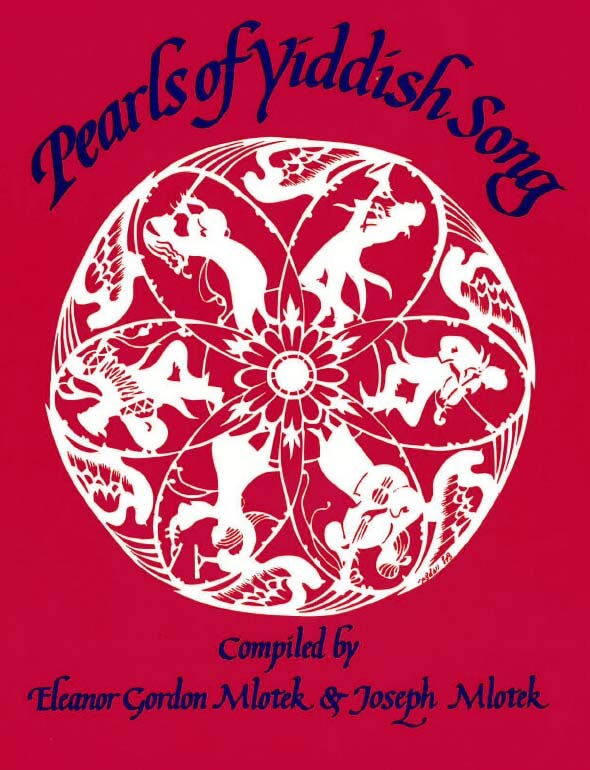Published in 1914 by Leo Kopf. Pinkhos Jassinowsky added an introductory stanza, published in sheet music by the Renanah Music Co, N.Y., 1924 and reprinted in Hasomir’s Sangbog, 1937: “Der rebe mit di khsidim/ Tantsn, plyesken, zlngen./ Zey shrayen ale: Rebenyu, oy rebenyu!”‘ (The Rabbi and the Hassidim dance, clap, and sing. They cry out: Dear Rabbi, oh dear Rabbi!). There is also an additional stanza: “Sha, shtil, makht nit keyn gerider,/ Der rebe zogt shoyn toyre vider. . . Un az der rebe zogt farn oylem toyre,/ Hern di khsidim mit groyser moyre.” (Shh, hush, don’t make a sound, the Rabbi is expounding the Torah again. . . And when the Rabbi teaches the Torah to the people, the Hasidim listen with great reverence.)
According to an eye-witness account in Seyfer Demblin-Modzhits, the song was adapted and sung during the Holocaust: “Sha, shtil, makh nit keyn gerider,/ S’iz in lager a kontrol vider./ Sha, shtil, makh nit keyn gevald,/ Di kontrol kumt aher bald./ Un az di kontrol kumt iz dokh vey un vind, / Men darf in lager nit zen keyn kind.” (Shh, hush, don’t make any noise, the guard is coming again; shh, hush, don’t make a clamor, the guard is coming soon. And when the guard comes, it’s woe to us — no child in the camp should be seen.)

Shh. Quiet. Don’t make a commotion,
the Rebbe is going to dance some more;
Shh. Quiet. Don’t cry out,
the Rebbe is just about to dance.
And when the Rebbe dances,
the wind dances with him.
Let’s all clap our hands.
And when the Rebbe dances,
the table dances with him.
Let’s all stamp our feet.
And when the Rebbe sings
the holy melody,
Satan lies dead.
Sha, shtil, makht nisht keyn gerider,
Der rebe geyt shoyn tantsn vider;
Sha, shtil, makht nisht keyn gevald,
Der rebe geyt shoyn tantsn bald.
Un az der rebe tantst,
Tantsn mit di vent,
Lomir ale plyesken mit di hent.
Un az der rebe tantst,
Tantst dokh mit der tish,
Lomir ale klapn mit di fis.
Un az der rebe zingt
Dem heylikn nign,
Blaybt der sotn a toyter lign.
שאַ, שטיל, מאַכט נישט קײן גערידער,
דער רבי גײט שױן טאַנצן װידער;
שאַ, שטיל, מאַכט נישט קײן געװאַלד,
דער רבי גײט שױן טאַנצן באַלד.
און אַז דער רבי טאַנצט,
טאַנצן מיט די װענט,
לאָמיר אַלע פּליעסקען מיט די הענט.
און אַז דער רבי טאַנצט,
טאַנצט דאָך מיט דער טיש,
לאָמיר אַלע קלאַפּן מיט די פֿיס.
און אַז דער רבי זינגט
דעם הײליקן ניגון,
בלײַבט דער שׂטן אַ טױטער ליגן.
Song Title: Sha, Shtil, Makht Nisht Keyn Gerider!

First published in 1988 as Pearls of Yiddish Song: Favorite Folk, Art and Theatre Songs, this anthology contains 115 songs. Some material had never been published, while others, included in rare song collections or sheet music, were largely inaccessible. The songs presented reflect Jewish life in Eastern Europe and the United States and depict childhood, love, family celebrations, poverty, work and struggle. There are also songs from the Hasidic and Maskilic movements, songs of Zion and of America, as well as songs from the Yiddish theater.
The title of this anthology derives from the weekly two-page feature column “Pearls of Yiddish Poetry,” which the compilers Yosl and Chana Mlotek initiated in 1970 in the Yiddish newspaper Der Forvertz (the Yiddish Daily Forward). Hundreds of readers from around the world — including authors, composers, singers, actors — became co-participants in this collective folk project and recalled melodies, lines, fragments, stanzas and their variants of songs, poems, and plays which they had heard in their youth. At first, readers sent in only written material. Later, they also taped songs on cassettes, many of whose melodies had, until then, never been recorded. They also identified and supplied missing information regarding lyricists, poets, and composers and described the circumstances surrounding the songs’ origins, their dissemination, diffusion and impact.